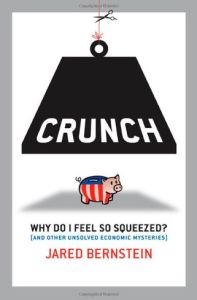Join getAbstract to access the summary!

Join getAbstract to access the summary!
Jared Bernstein
Crunch
Why Do I Feel So Squeezed? (And Other Unsolved Economic Mysteries)
Berrett-Koehler, 2008
What's inside?
Vice President Biden’s economic adviser answers all your questions about the economy.
Recommendation
At last someone has written a lucid explanation of the American middle class’s financial stagnation. Economist Jared Bernstein – chief economic adviser to Vice President Joseph Biden – provides a tremendous service to millions of Americans who wonder why so many two-income households remain financially insecure. Bernstein understands that most economics writing is impenetrable. He explains in lively prose why financial inequality is alive and well in 21st-century America. It’s an issue the mainstream media rarely covers. The book is structured around the gimmick of answering American’s most common questions about economics, and some of the miniessays don’t connect, but getAbstract recommends it to working people who want to know why they are entrenched in the proverbial rat race despite political promises that they are on the verge of financial security – a state, Bernstein emphasizes, that will remain elusive for most Americans.
Summary
About the Author
Jared Bernstein is senior economist and director of the Living Standards Program at the Economic Policy Institute in Washington, D.C. He wrote All Together Now: Common Sense for a Fair Economy and is the co-author of eight editions of The State of Working America.

















Comment on this summary